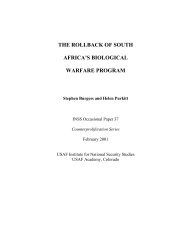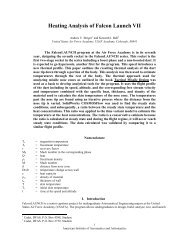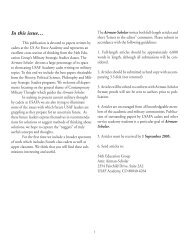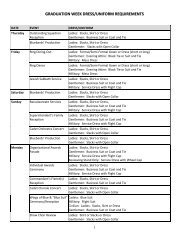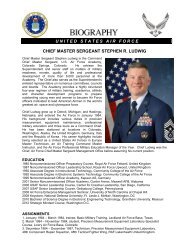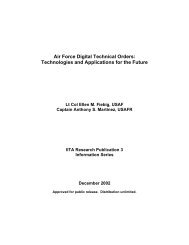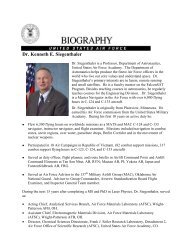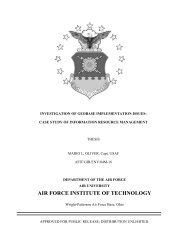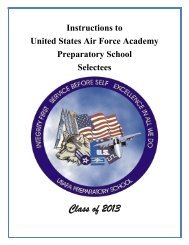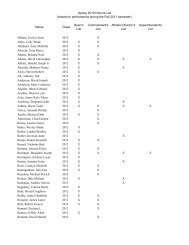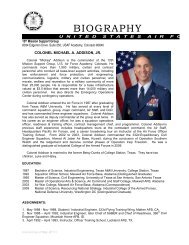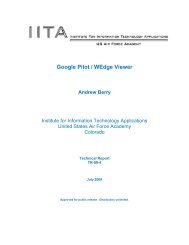Military Professionalism - United States Air Force Academy
Military Professionalism - United States Air Force Academy
Military Professionalism - United States Air Force Academy
You also want an ePaper? Increase the reach of your titles
YUMPU automatically turns print PDFs into web optimized ePapers that Google loves.
Collins, Joseph J. “What Civil-<strong>Military</strong> Crisis?” Armed <strong>Force</strong>s Journal 147.6 (Feb.<br />
2010): 18-21.<br />
http://www.armedforcesjournal.com/2010/02/4419089/<br />
Collins cites Eliot Cohen, who wrote that “statesmen must actively and, if need be,<br />
relentlessly question their top generals on operational issues and defense management,<br />
challenging their responses and holding them accountable for results. Civil-military<br />
relations are thus an unequal dialogue with the civilian superior establishing the<br />
boundaries between executive authority and military expertise.” Officers should offer<br />
their advice to civilian leadership in private settings. Retired officers should not endorse<br />
political candidates because this behavior might unduly influence former subordinates or<br />
be interpreted as the views of the armed forces as a whole. The Joint Chiefs of Staff<br />
should consider issuing a code of conduct for retired military officers.<br />
Clifford III, George M. “Duty at All Costs.” Naval War College Review 60.1 (Winter<br />
2007): 103-128.<br />
http://www.usnwc.edu/getattachment/5287bda8-d220-4b47-82e1-c65f25f45801/Duty-at-<br />
All-Costs---Clifford,-George-M-,-III<br />
When given a morally objectionable assignment, there are four ways in which officers<br />
can respond. First, stay quiet and hope for the best. Second, depart quietly. Third,<br />
depart with public protest to draw public attention to the situation. Fourth, quietly obey<br />
for as long as possible and then depart, walking a fine line between discreet silence and<br />
public protest. The context determines which option is the most appropriate.<br />
Davidson, Michael J. “Contemptuous Speech against the President.” The Army<br />
Lawyer (Jul. 1999): 1-12.<br />
https://www.jagcnet.army.mil/JAGCNETINTERNET/HOMEPAGES/AC/ARMYLAWY<br />
ER.NSF/Main?OpenFrameset<br />
“The current prohibition against contemptuous speech directed against the President is<br />
contained in Article 88 of the Uniform Code of <strong>Military</strong> Justice (UCMJ). From its earliest<br />
days, this military prohibition has been a mechanism to ensure the foundational<br />
cornerstone of our Republic, that military power is subordinate to the authority of our<br />
civilian leadership. Additionally, like other punitive articles that criminalized disrespect<br />
and insubordination to military superiors, this provision of military law serves to enhance<br />
discipline and to protect the hierarchical system of rank within the military.”<br />
Dunlap, Charles J. “Voices from the Stars? America’s Generals and the Iraq<br />
Debate.” ABA National Security Law Report 28.4 (Nov. 2006): 8-9.<br />
Instinctive loyalty to, and respect for, the chain of command disinclines military<br />
professionals from airing disagreements. This is as it should be unless and until that<br />
34




